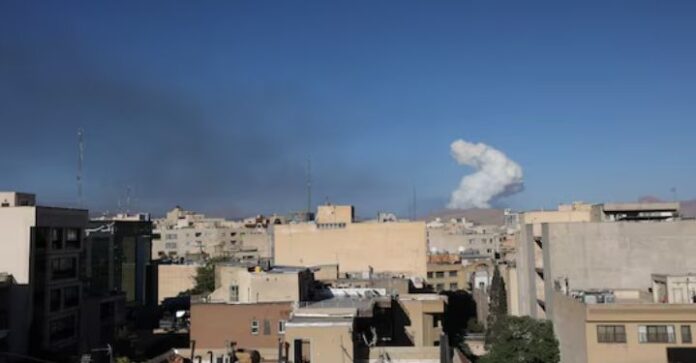Central Israel (June 20, 2025) – On the eighth consecutive day of the escalating military confrontation, Iran launched a ballistic missile armed with cluster munitions into central Israel late Thursday evening, marking an unprecedented escalation in weaponry use since the onset of hostilities. Israeli officials reported widespread impact from the submunitions, sparking international alarm and emphasizing the long-term peril posed by unexploded bomblets.
Missile strike in central Israel
At approximately 11:00 p.m. local time, Israel’s Home Front Command issued public alerts after detecting an incoming Iranian missile. Around 20 anti-personnel submunitions were released over the towns of Azor, Ramla, and Lod, creating a 5-mile-wide scatter field. While civilian infrastructure sustained damage—including shattered windows, cratered roads, and gutted vehicles—Israeli authorities confirmed there were no immediate fatalities, though at least 73 people were treated for shrapnel and debris-related injuries.
One submunition struck a residential home in Azor, resulting in structural harm and minor injuries to the occupants. Community leaders warned that the scattered bomblets had turned once-safe areas into danger zones, potentially risking hikers, children, and emergency personnel alike .
Why cluster munitions change the calculus
Cluster bombs release dozens, even hundreds, of smaller bomblets meant to blanket a wide area. Their indiscriminate nature is particularly devastating in civilian-populated zones. The real danger lies in the fact that up to 30% of these bomblets often fail to detonate on impact, leaving a long-lasting, unpredictable risk—similar to landmines—for years after the initial strike. The 2008 Convention on Cluster Munitions, signed by over 100 countries, explicitly bans their use in populated regions—although neither Iran nor Israel is a signatory.
Civilian and emergency response
Israeli home front officials immediately ordered evacuations and deployed demining specialists to suspected strike zones. Medical responders treated dozens for lacerations, concussion, and panic-induced injuries. Israeli media reported that local police cordoned off large areas, and warning signs were posted to deter residents from returning without clearance.
At Soroka Medical Center in Beersheba, already damaged earlier in the conflict, a new sense of urgency has taken hold. Patients and staff alerted authorities as they encountered unexploded submunitions outside adjacent clinics.
International condemnation and legal implications
Israel’s Ministry of Foreign Affairs formally called the attack a “war crime” and has filed complaints at international forums, including the UN Security Council, citing the indiscriminate nature of cluster weapons. Western governments—including the United States, Germany, United Kingdom, and EU—issued urgent statements condemning the strike. EU officials described the tactic as “deeply troubling” and demanded an immediate halt to escalating attacks .
Analysts warn that deploying cluster munitions in densely populated areas is a major escalation in international law and could prompt further sanctions or other forms of international action against Tehran.
Military strategy and regional dynamics
Iran’s use of cluster munitions follows nearly a week of reciprocal strikes, including at least 450 missiles and drones launched at Israel earlier in the conflict. In response, Israel reportedly hit key Iranian military and nuclear infrastructures—air bases, missile facilities, and notably, the heavy-water reactor at Arak and the uranium enrichment site at Natanz.
The Israeli Defense Ministry said its strikes aimed to degrade Iran’s missile capabilities and deter further escalation. Tehran has portrayed its actions as defensive—while Israel maintains it will intensify targeting of military command centers and nuclear infrastructure until their enemy backs down.
Diplomatic efforts at a critical juncture
Amid rising fears of an expanded war, diplomacy has surged. In Geneva today, EU foreign ministers from France, Germany, and the UK—alongside EU foreign policy chief Katarina Barley—are meeting with Iran’s Foreign Minister Abbas Araghchi. Their goal: to establish a cease-fire and negotiate a pause that can pave the way for broader de-escalation.
Iran, however, remains unyielding. Foreign Minister Araghchi told state media that “no talks are possible while Israeli strikes continue,” and Iran refuses to tie diplomatic progress to halting its nuclear program.
U.S. posture and global security implications
The United States has stood firmly behind Israel, providing defensive systems and intelligence support. President Joe Biden announced that the U.S. will “aid in shooting down Iranian missiles” and will weigh whether to take its own military actions against Iranian nuclear targets—like the Fordow facility—within the next two weeks.
Other global powers are urging caution. Russia and China have both called for restraint, warning that further escalation “benefits no one” . The UN Secretary-General, Antonio Guterres, described the situation as “an alarming spiral” and urged “immediate cease-fire and humanitarian steps.”
The humanitarian aftermath
Beyond immediate casualties, the spread of unexploded submunitions threatens long-term harm. Demining efforts could take months or years, with education campaigns urgently needed for communities unaware of the hazard. NGOs like the International Committee of the Red Cross and IsraAID have begun organizing awareness programs to help civilians recognize and avoid unexploded bomblets.
Looking ahead
As day eight ends, the conflict teeters on the brink of a broader regional war. Iran’s use of cluster weapons has fractured long-standing military thresholds and forced global leaders to contemplate new forms of intervention. The coming 48 hours—shaped by Geneva talks and U.S. decision-making—may determine whether diplomacy can restrain a spiral into wider violence or if the war will escalate beyond the Middle East.

